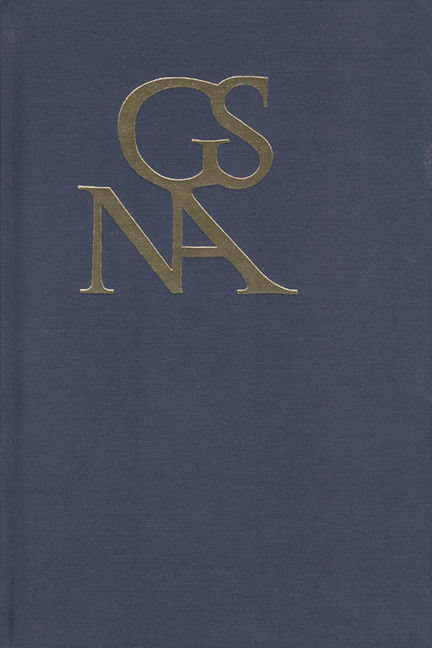Book contents
- Frontmatter
- Contents
- Reorientations around Goethe
- Reorientations around Goethe II
- Special Section on Goethe's Narrative Events edited by Fritz Breithaupt
- What Is an Event for Goethe?
- Much Ado about Nothing? The Absence of Events in Die Wahlverwandtschaften
- Countering Catastrophe: Goethe's Novelle in the Aftershock of Heinrich von Kleist
- Narrating (against) the Uncanny: Goethe's “Ballade” versus Hoffmann's Der Sandmann
- Remembering Klopstock's Mitausdruck
- Strategic Indecision: Gender and Bureaucracy in Schiller's Maria Stuart
- The Dark Green in the Early Anthropocene: Goethe's Plants in Versuch die Metamorphose der Pflanzen zu erklären and Triumph der Empfindsamkeit
- Abschlussbewegungen: Goethe, Freud, and Spectral Forms of Life
- Ein Mythos und sein doppelter Entzug des Modernen: Prämissen für einen Ausweg aus der Unübersichtlichkeit der Faustforschung
- Johann Wolfgang von Goethe in Conversation with Things
- World Literature Turns Political, 1835/36: The Early Afterlife of Goethe's Pronouncement in German Cultural-Politics and in the Young Germany Movement
- Fritz Strich and the Dilemmas of World Literature Today
- A Jewish Faust Commentary: Notes on Franz Rosenzweig's The Star of Redemption
- From Idylle to idílio: Mário de Andrade's Parody of Hermann und Dorothea
- Koselleck's Timely Goethe?
- Book Reviews
Countering Catastrophe: Goethe's Novelle in the Aftershock of Heinrich von Kleist
from Special Section on Goethe's Narrative Events edited by Fritz Breithaupt
Published online by Cambridge University Press: 26 June 2019
- Frontmatter
- Contents
- Reorientations around Goethe
- Reorientations around Goethe II
- Special Section on Goethe's Narrative Events edited by Fritz Breithaupt
- What Is an Event for Goethe?
- Much Ado about Nothing? The Absence of Events in Die Wahlverwandtschaften
- Countering Catastrophe: Goethe's Novelle in the Aftershock of Heinrich von Kleist
- Narrating (against) the Uncanny: Goethe's “Ballade” versus Hoffmann's Der Sandmann
- Remembering Klopstock's Mitausdruck
- Strategic Indecision: Gender and Bureaucracy in Schiller's Maria Stuart
- The Dark Green in the Early Anthropocene: Goethe's Plants in Versuch die Metamorphose der Pflanzen zu erklären and Triumph der Empfindsamkeit
- Abschlussbewegungen: Goethe, Freud, and Spectral Forms of Life
- Ein Mythos und sein doppelter Entzug des Modernen: Prämissen für einen Ausweg aus der Unübersichtlichkeit der Faustforschung
- Johann Wolfgang von Goethe in Conversation with Things
- World Literature Turns Political, 1835/36: The Early Afterlife of Goethe's Pronouncement in German Cultural-Politics and in the Young Germany Movement
- Fritz Strich and the Dilemmas of World Literature Today
- A Jewish Faust Commentary: Notes on Franz Rosenzweig's The Star of Redemption
- From Idylle to idílio: Mário de Andrade's Parody of Hermann und Dorothea
- Koselleck's Timely Goethe?
- Book Reviews
Summary
THAT THE MAJORITY of scholarship on the Goethe-Kleist relationship proceeds from their dramatic work is understandable, since this was the subject of their limited correspondence and since Goethe was the powerful theater director whose approbation Kleist needed and famously did not receive. The conclusion often reached is that theirs was a struggle between the establishment classicist and the young harbinger of the Romantic or modern, one neatly summarized by Goethe's characterization of Kleist's Amphitryon as “ein bedeutendes, aber unerfreuliches Meteor eines neuen Literatur-Himmels” (a significant but not encouraging meteor in a new literary sky). But such consideration of their respective novellas is comparatively scarce, despite their instrumentality in establishing the German novella tradition as we know it today.
In a brief passage in his 2008 book about Kleist, Dirk Grathoff uncovers a revealing citation of Wilhelm Meisters Lehrjahre (Wilhelm Meister's Apprenticeship). Examining the societal catastrophe in the relevant section of Wilhelm Meister (the robbery of the actors’ troupe) alongside the natural catastrophe (the plague) in Kleist's Der Findling (The Foundling), Grathoff concludes that Kleist is pushing back against Goethe to create an anti-bildungsroman. While Grathoff's generalization that Kleist's work could only exist in relationship to Goethe's work is certainly accurate, this article will argue that the reverse is also true: Goethe's late prose exists in direct relationship to that of Kleist and contains citations of it, also with the awareness that the future of a genre is at stake. The 1828 Novelle in particular can be read principally as an intervention that sees Goethe pursuing two interrelated projects: to rescue the genre from pretenders or aspirants whose tales or stories were being misidentified as novellas; and to heal the Kleistian sickness he saw spreading in German literature. In reading Goethe's Novelle as a reclamatory and therapeutic engagement with Kleist, I will focus here on Das Erdbeben in Chile (The Earthquake in Chile), Kleist's first novella to appear in print. I will show that Goethe's text contains many echoes of the Erdbeben and invests significant energy to rework it, in ways that illuminate the contestation of the genre. In this reading Goethe's Novelle seeks—to use Fritz Breithaupt's formulation—“to reestablish a state of stability after the occurrence of an event-that-should-not-be.”
- Type
- Chapter
- Information
- Goethe Yearbook 26Publications of the Goethe Society of North America, pp. 65 - 78Publisher: Boydell & BrewerPrint publication year: 2019



